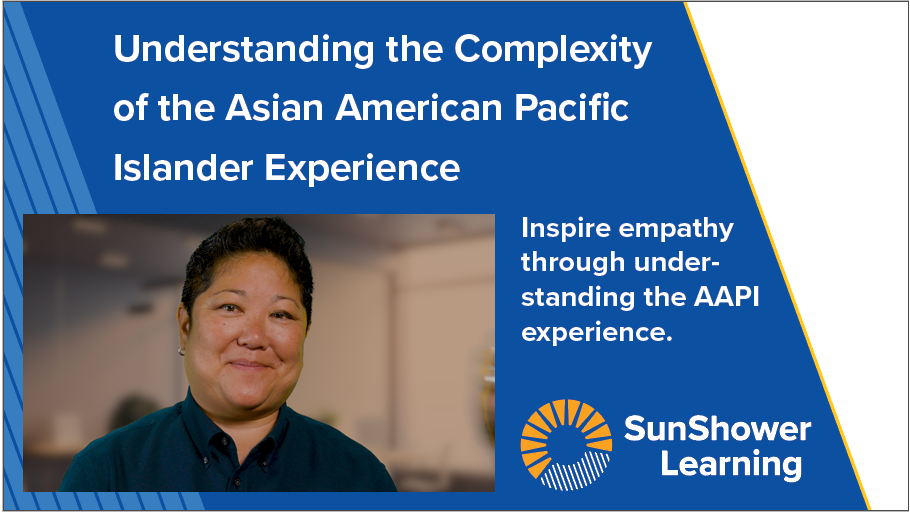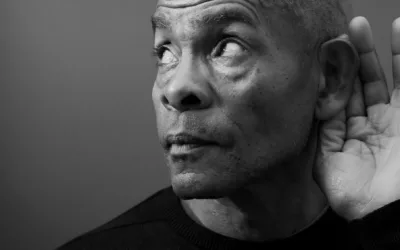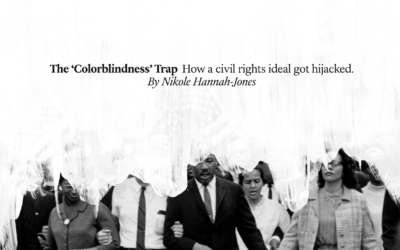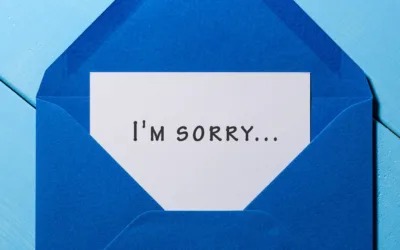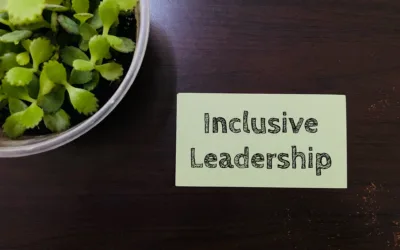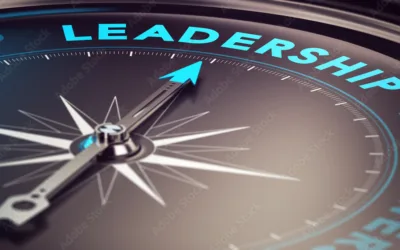From HBR: How Americans’ Biases Are Changing (or Not) Over Time
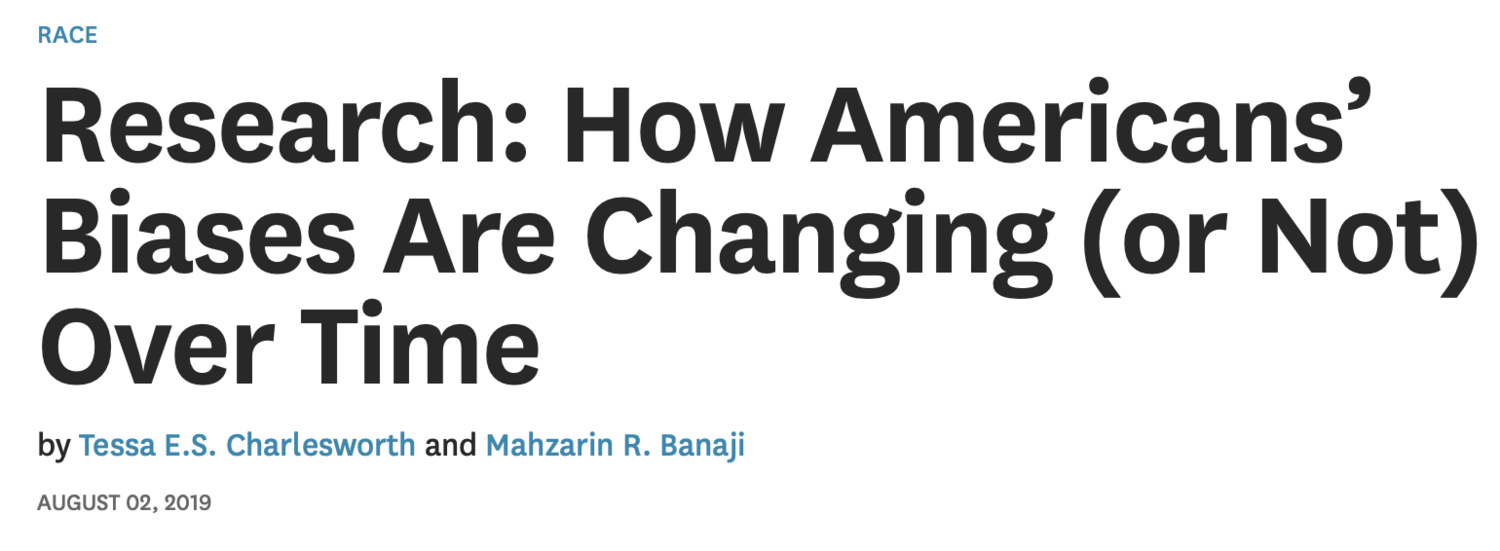
Excellent article from Charlesworth and Banaji.
“Our new research shows, for the first time, that the implicit attitudes of a society can and do change durably over time —although at different rates and in different directions depending on the issue. Drawing on data from over 4 million tests of explicit and implicit attitudes collected between 2007 and 2016, we found that Americans’ implicit attitudes about sexual orientation, race, and skin tone have all decreased meaningfully in bias over the past decade. We also found some areas (age, disability, and body weight) for which the news is not so positive.”
“In 1937 only 33% of Americans believed that a qualified woman could be president; in 2015, 92% endorsed the possibility. In 1958 only 4% of white Americans approved of black-white marriages; today 87% of white Americans do. These findings highlight the fact that our minds can and do change toward greater equality of opportunity. This is good news for business leaders, since greater diversity has many benefits for organizations. For example, it allows the best talent to emerge, makes teams smarter, and improves financial performance.”
Here at SunShower, we not only believe in change, we’ve seen the effect of our training programs that give people the tools to change. With the Ouch! programs and Defeating Unconscious Bias, we’ve seen and heard reports that there are positive changes that stick, long after the elearning course or workshop.
In fact, a study at the University of Cincinnati showed that 82% of Ouch! trainees had already used the Ouch! skills in their workplace interactions and personal lives within 3 months. It also documented that trainees had a statistically significant increase in awareness of bias and stereotypes and a lasting positive change in their comfort and confidence to speak up using Ouch! skills. The study showed that trainees were more likely in the future to speak up against stereotypes or bias they encountered at work, home and in social settings.
More From Our Blog…
Understanding Employee Responses to DEI Initiatives: Insights and Strategies
A recent study sheds light on a previously underexplored aspect of DEI training. While much focus has been placed on the facilitators, trainers and the content of DEI programs, this study examines how employees actually respond to the training. Published in Harvard...
SHRM’s Removal of “Equity” From DEI Framework: A Step Backwards Amid Growing Backlash
In a stunning step in the wrong direction, the Society for Human Resources Management (SHRM), the world’s largest HR association, has removed “Equity” from its “IE&D” framework. What message does this send, especially amid strong pushback against Diversity, Equity...
Navigating the Shifting Landscape of Diversity, Equity and Inclusion Programs
In the midst of the evolving landscape of corporate diversity initiatives, there's a seismic shift underway. The once-prominent acronym "DEI" - representing diversity, equity and inclusion - is notably absent from many company discussions. As explained in the article...
A Groundbreaking New Course: Understanding the Complexity of the Asian American Pacific Islander Experience
With over two decades of experience in the educational sector, Hideko Akashi, founder and lead consultant at Liberation Consulting, has been a steadfast advocate for diversity, privilege, social justice, inclusion and equity. Now, she's opening a new chapter with the...
The Deafening Silence of DEI Allies: A Call to Action in Troubled Times
As we commemorate the legacy of Rev. Dr. Martin Luther King Jr., his poignant words echo through the corridors of history, reminding us of the profound impact of silence in the face of injustice.” In the end, we will remember not the words of our enemies, but the...
DEI LEAP: Empowering Leaders Through Turbulent Times
DEI LEAP: Empowering Leaders Through Turbulent Times As we all know, 2024 has brought a wave of attacks against DEI. A handful of outspoken critics, such as Elon Musk, are misrepresenting DEI and attacking the strategies and practices that are creating more equitable...
The Colorblindness Trap
Read. This. Article. It's important. The Color Blindness Trap: How a civil rights ideal got hijacked Nikole Hannah-Jones is a domestic correspondent for The New York Times Magazine focusing on racial injustice. Her extensive reporting in both print and radio has...
The Unbearable Lightness of the “I’m Sorry if You Were Offended” Apology
Have you ever come across that non-apology apology? You know, the one that goes, "I’m sorry if you were offended," or its close cousin, "I’m sorry that you…" These non-apologies aren't just weak; they can actually inflict more harm and exacerbate hurt feelings. They...
The Power of Diversity: McKinsey’s Latest Report Reinforces the Business Case for Inclusive Leadership
In an era where corporate social responsibility is no longer just a buzzword but a fundamental aspect of successful business strategies, McKinsey's latest report, "Diversity Matters Even More: The Case for Holistic Impact," underscores the undeniable link...
“Laying Low” Is the Wrong DEI Strategy
“The ultimate measure of a man is not where he stands in moments of comfort and convenience, but where he stands at times of challenge and controversy.”- Martin Luther King, Jr. In an era marred by politicized attacks on diversity, equity and inclusion (DEI), Shaun...




